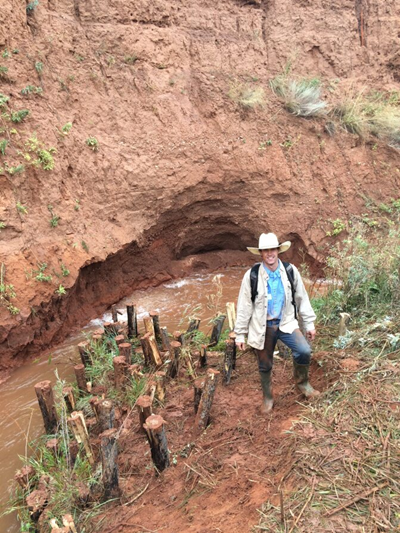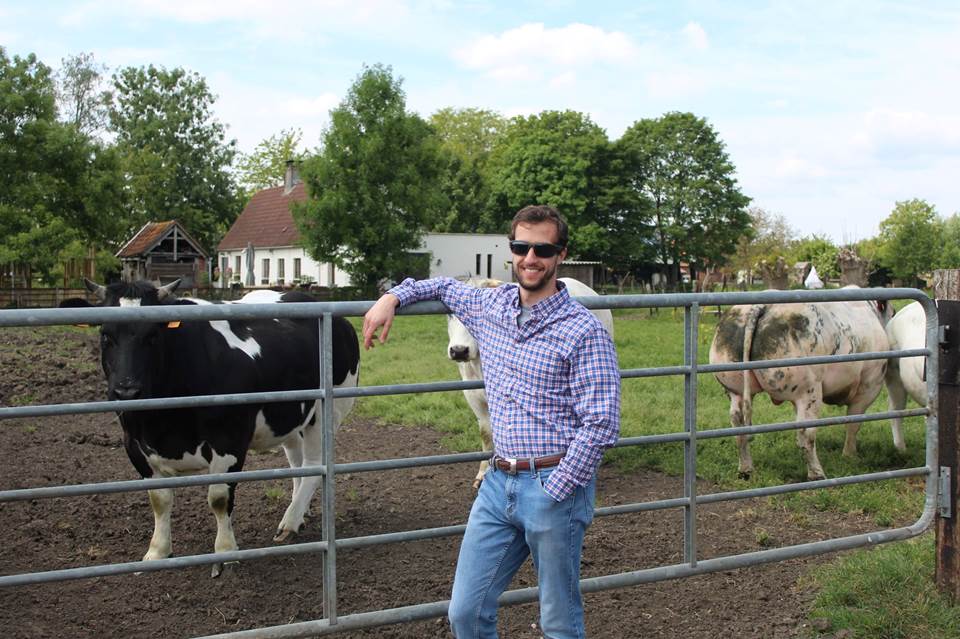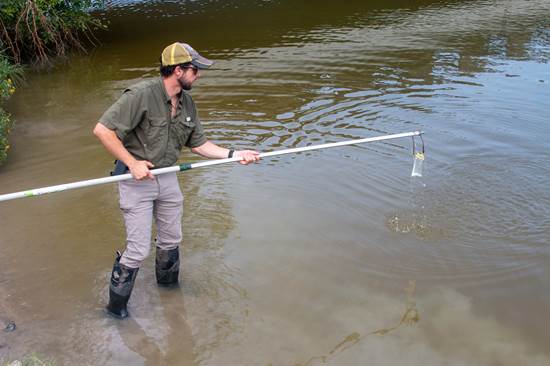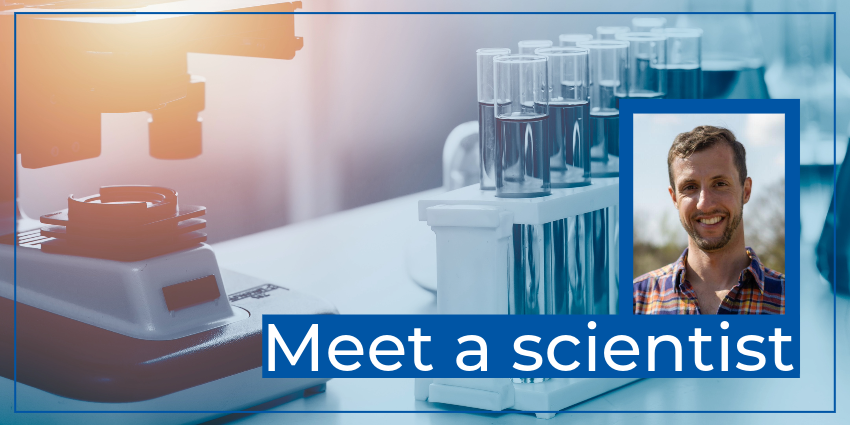The natural environment one grows up in can heavily influence their interests and path in life. Texas Water Resources Institute Research Specialist Jason Gerlich grew up outdoors, happiest when surrounded by agriculture and nature, and pursuing that love has taken him across the world and back to his home state to work on water quality issues.
While he was always certain that his future was in science, Gerlich was unsure what that meant when he graduated high school.
“I knew from a pretty early age that my passion lived in the outdoors and nature and how agriculture and the environment interact with each other,” Gerlich said. “That really drove me in the direction I’ve taken.”
One defining event happened during his senior year of high school when Gerlich was chosen to participate in the calf scramble at both the Houston and Austin Livestock Show and Rodeo. One calf won first place in the American Breed Calf Scramble Steer division at the Houston Livestock Show and Rodeo.
Raising cattle helped him decide to attend Colorado State University, where he entered the School of Agriculture with an undeclared major, and eventually led to his interest in studying abroad.

“I remember sitting down with my parents and telling them ‘I’m going to go to college and figure out what I want to do, not just accept something and hope that that’s what it is,’” Gerlich said.
From Texas to Colorado
Once he got to Colorado State, Gerlich wasted no time getting plugged into campus life and figuring out his next steps.
“I knew what I wanted was related to environmental science or agricultural sciences, but those are very broad fields,” Gerlich said.
His first semester, he volunteered to go to a large cattle ranch in northern Colorado, where a stream had been cutting a small canyon through a farmer’s field.
“We did a meandering project where we got muddy and dirty in the water and were basically trying to put artificial meanders into this river to slow down the flow,” Gerlich said. “I thought it was so exciting. I got to combine everything I loved, and it led me to declare for watershed science and soil science.”
From Colorado to England and Iceland
Gerlich has also always enjoyed travel and trying new things, so after he settled into college, he soon decided his next adventure needed to be out of the country.
“I’d seen people go on study abroad programs, but there wasn’t really a path in my major for that, so I sat down with my advisor,” Gerlich said. “She told me that in the past they had sent some students to the University of Exeter, Penryn in the very southwest of England.”
It was a done deal after that. Gerlich met with his professors to define his coursework and transfer credits and was soon across the ocean. He studied at the University of Exeter life sciences campus, where in the small town, students were able to see their science in action.
“There were lots of geology majors, environmental science majors, sustainability majors, and because it’s a really small town, the university’s focus is life sciences and the agricultural field,” Gerlich said. “That was a spark that would lead me to study abroad again.”
Gerlich studied in England for six months and then went to Iceland for a group research trip to study the impacts of climate change on the metabolic rates of micro macrofauna and geothermal streams.
“They basically posted us 20 college students in a hostel in the middle of nowhere in an old lava field,” Gerlich said. “It was absolutely incredible.”
From Colorado to Belgium and Denmark
After that, Gerlich returned to Colorado State to finish his degree but had his sights set on going abroad again for his master’s and applied to an international master’s degree in soil science and global change in Belgium.
“I think if you're ever going to go to school, or do anything, you should always have something that maybe is your dream or your reach,” Gerlich said. “That was this program for me, I applied and forgot about it. Then I got a call from Belgium saying that I’d been accepted, and I was ecstatic.”
Once again across the ocean, his specific program was a joint program, beginning with one year in Belgium at the University of Ghent and the second year at the University of Aarhus in Denmark.
One big draw of the program for Gerlich was its focus on applied skills, getting out in the field and being hands-on. But, during his second semester, COVID-19 hit the world, sending him and everyone else into a lockdown.

“It wasn’t until pretty much the last quarter of the master program where things got a little more loose that I was able to move around more,” he said.
Gerlich made the most of it being stuck though, moving in with a family in Belgium and working on their farm. While he was not able to get the hands-on approach with his classes, working on the farm allowed him to still see and reemphasize the lessons he was being taught.”
“We always had the most vibrant discussions amongst the family about what I was learning and how that could also benefit them,” Gerlich said. “The community that developed during COVID, of a Texan living in this little small town on a farm in Belgium, was absolutely incredible.”
After his move to Denmark later that year, Gerlich’s thesis focused on working with farmers to reduce erosion. But his love for water continued outside of the classroom too, as Gerlich would become a surf and paddle board instructor in his spare time in Denmark.
From Denmark to Serving Texans at TWRI
Gerlich returned to the U.S. after receiving his master’s and started at TWRI soon after. While it had been years since he had called Texas home, Gerlich was ready to take on the water challenges facing Texas.
“Being successful here comes down to a few things. One is the ability to talk to people, and the ability to communicate the latest science or information. That, and also listening to them communicate to you about what their issues are and how we can help address them,” Gerlich said.
“Having a diversified background and a global perspective on issues, being able to utilize those skills that I learned from my time overseas and in Colorado, applying all of that to Texas, helps allow me to make a positive impact on Texans’ lives.”
As a research specialist for TWRI, Gerlich works on a wide range of projects focused on water quality improvements. He helps conduct monthly water quality monitoring at several sites and is involved in the development of watershed protection plans and total maximum daily loads projects.
Gerlich is part of a watershed characterization project for Town Creek to better understand and address bacteria impairments there. Furthermore, he is working on the Medina River Watershed Protection Plan.

He is also participating in the $10 million USDA-NIFA grant providing technical help in the field and studying the impacts of implemented practices on water quality and soil health. This study looks at regenerative agricultural practices in row crop agriculture with some small watershed plots in parts of North Texas and Oklahoma.
Gerlich has recently co-authored a research paper titled, Edge-of-Field Runoff Analysis following Grazing and Silvicultural Best Management Practices in Northeast Texas, looking at how BMPs, or best management practices, can impact water quality.
“I also really enjoy public speaking, being able to communicate what advice other folks have here at TWRI to the public and helping stakeholders make the best-informed decision that they can,” Gerlich said.
Looking back on his path to TWRI, Gerlich’s advice for students, no matter their age, is to say yes to everything and try different things to find what you love.
“I look back at that first semester of college and I was busy all the time,” he said. “But I was learning what drove me and excited me to get up every day. You’ll slowly figure out what it is that gives you that spark and gives you the confidence to pursue what you’re interested in.”


